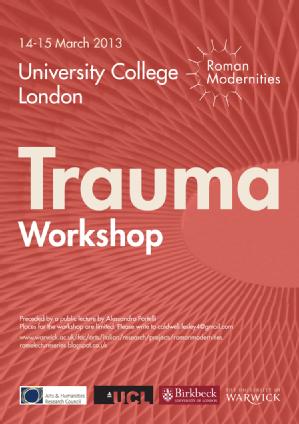Trauma Workshop
The lecture and workshop which make this trauma event - taking place at the University of London between 14 and 15 March 2013, aims to explore the framework of 'trauma' that underlies Rome's Modernity. This will be examined in the papers and the discussion that follow through theoretical questions and approaches, and key case studies such as the migrant experience in Rome and the memorializing of the Holocaust in Italy.
Event Outline:
Day 1 – Thursday 14 March – 6.00 pm
University College London
Christopher Ingold G 21 – Ramsay Lecture Theatre
Rome Lecture
Alessandro Portelli: Migrant expression in Multicultural Rome: music and stories
This lecture focused on changes in the city of Rome’s demographics and identity, and how this is reflected in the literature and music of migrants.
This lecture was organized in conjuction with the Rome Lecture Series, organized by Lesley & Dorigen Caldwell and hosted by the UCL and Birkbeck U of L. For more information, please see their blog - click here
Day 2 – Friday 15 March 11.00 -6.00
University College London,
Italian Department Seminar room, Foster Court 351
Workshop:
1. Suzanne Stewart Steinberg: ‘Damnatio Memoriae’: Italian Fascism Between Trauma and Identity
Stewart Steinberg's paper furnished some first methodological reflections on the ways in which psychoanalytic theory may contribute to the Italian historiographical debate about the fascist past, with a special focus on the problems of how the history-memory debate has been played out in the Italian context.
2. Robert Gordon: Rome’s Missing Holocaust Museum. Building Sites and Stumbling Blocks
Like many European and North American capital cities, Rome has developed and approved detailed plans to build a national Holocaust museum. Gordon's paper explored the politics of memory and of local and national identity that lay behind these plans, the tensions and pressures that have made it such a complicated goal to achieve over the last ten years, and what all this means for Italy’s memory of the Holocaust and the role of Rome within in.
3. Lesley Caldwell: Locating trauma. Rome: Fabric and Memory
Caldwell's paper attempted to interrogate our capacity to read Rome's cityscape through 'trauma' as a critical term; and how successful this might be. It draws upon local experiences of the urban fabric in order to illustrate the city's shifts and mutations.
This workshop was organized in conjunction with the Rome Lecture Series, and the workshop is organised by the University of Warwick, University College London and Birbeck College as part of the AHRC-funded research network ‘Roman Modernities’, led by Fabio Camilletti (Warwick) as Principal Investigator and Lesley Caldwell (UCL) as Co-Investigator. The project aims to allow scholars, artists, and urban planners to engage in joint enquiry on Rome as a paradigmatic location for reconfiguring the trajectory of Western modernity, and involves as its partners CROMA at the University of Roma Tre, the Archivio di Stato di Roma and the Berlin Institute for Cultural Inquiry.
Speakers:
Alessandro Portelli has recently retired from teaching American Literature at the University of Rome La Sapienza. He is the author of a numer of books and essays in oral history, music and literature (including the recent They Say in Harlan County: An Oral History). A former advisor on public memory to the Mayor of Rome, he is the founder and chairperson of the Circolo Gianni Bosio, an independent research organization on music, oral history and popular cultures.
Suzanne Stewart Steinberg is Professor of Italian Studies and Comparative Literature at Brown University. She holds a BA from the University of Essex (UK) in Sociology, a Ph.D. in Political Science from Yale University, and an MA in German Studies from Cornell University. She is the author of Sublime Surrender: Male Masochism at the Fin-de-Siecle (Cornell University Press, 1998), The Pinocchio Effect: On Making Italians, 1860-1920 (University of Chicago Press, 2007; winner of the MLA Aldo and Jeanne Scaglione Prize for best manuscript in Italian literary studies), with Italian translation: L’effetto Pinocchio, Italia 1861-1922. La costruzione di una complessa modernità (Elliot Edizioni, 2011); and Impious Fidelity: Anna Freud, Psychoanalysis, Politics (Cornell University Press, 2012; Chinese translation forthcoming in 2014).
Robert Gordon is Serena Professor of Italian at Cambridge University. His most recent book is The Holocaust in Italian Culture 1944-2010 (Stanford, 2012), in Italian as Scolpitelo nei cuori. L’olocausto nella cultura italiana (Bollati, 2013).
Lesley Caldwell is Honorary Reader in the Psychoanalysis Unit at UCL where she teaches and supervises, and is responsible for the Interdisciplinary programme. She is also Honorary Senior Research Associate in the Italian Department where she co-organises the termly lecture series on Rome (UCL/ Birkbeck). She is a psychoanalyst in private practice in London. Rome: Continuing Encounters between Past and Present (Palgrave) edited with Dorigen Caldwell came out in 2011. With Helen Taylor Robinson she is managing editor of the Collected Writings of Donald Winnicott.

